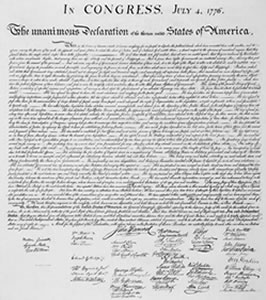
The Colonial Experience in America seems to us a part of the distant past, with little relation to our daily lives in the 21st century. Visiting our colonial ancestors, however, shows clearly that many ideas, forms, and practices which evolved in the two centuries before the American Revolution became deeply imbedded in our national psyche and organization.
I grew up in a small village in New York State, population less than 5,000. Even with that small size, we were a self-contained political structure. We had our own government, including a mayor, police force, public library, school system, public works department and everything else that makes an independent political entity. That sort of structure is true in a wide swath across the North as far west as the Mississippi River. The reason for that independent arrangement goes back to the New England structure and the practice of Congregationalism. The New England town meeting was how business was conducted.
Contrast that with the state of Virginia, where I now live. We live in an area identified by our ZIP Code with a population of over 32,000, but we have no local government, no mayor, no police force or school board. The only entity in our area is our volunteer fire department, which is still part of the county system.We are governed by the county in which we live, and that goes to the structure of the Anglican church which was divided into parishes that incorporated individual congregations. Variations on that idea exist all over the country, and they bear the influence of the Spanish settlement of Florida and the Southwest, the Cajun culture in Louisiana, and the independence of the states of the Great Plains and others that stretched to the Pacific coast. Whatever structure exists anywhere in the country has roots that go deep into the past
The past is still with us—we are branches on a tree with many roots that go very deep. While We may not immediately identify with Pennsylvania German Pietists, New England Puritans, Virginia planters, indentured servants, slaves or Native Americans, Quakers, Anglicans, Methodists, Swedish farmers, Dutch traders or French Huguenots, all of those groups and more contributed to our heritage and legacy. Sometimes it is necessary only to scratch the surface of our present selves to see where we came from.
Readings
External Links
- Jamestown
- Virginia
- Historic Maps
- Archiving Early America
- Colonial Web Sites
- Colonial Williamsburg
- Plymouth Colony Archive
- Yale Avalon Project Colonial
- Massachusetts Bay
- Maryland Colony
- New York Colony
- Pennsylvania
- Delaware
- Colonial History
- Fort William Henry
- Fort Ticonderoga
- Battle of Quebec 1759
- Plains of Abraham Battle

Declaration of Independence
Documents
- The Albany Plan of Union
- James Otis on Searches
- Philosophy of John Locke
- The Virginia Bill of Rights

Colonial America | Colonies & Empire | American Revolution | Sage History Home | Updated June 1, 2020